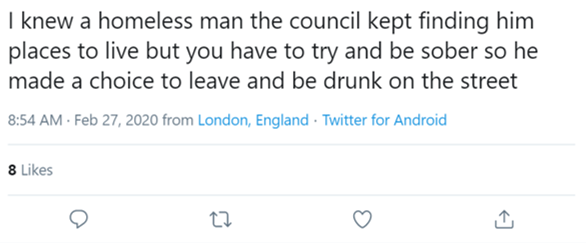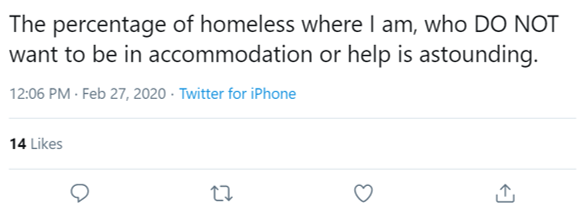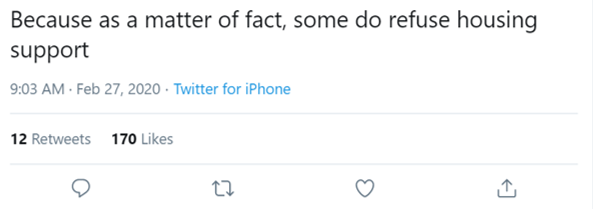Recently, Conservative MP Adam Holloway received criticism for his claims in parliament that many rough sleepers choose to be on the streets. What is it that fuels this idea? To what extent is it true?
As Bench Outreach’s resident Gen Z, I’m the one responsible for managing our twitter and keeping up to date with what’s being said about homelessness online. One thing I can say for certain is that with rough sleepers constantly visible and growing in number, almost everyone has an opinion on homelessness. *sigh*
One of the strikingly common opinions I’ve noticed is that if they really wanted to, there are services that rough sleepers could access that would give them somewhere to stay. The problem, these people profess, is that homeless people want to be homeless. They simply would rather be on the streets and won’t accept help. So, here’s my explanation of why these arguments are overlooking some pretty serious details. (Can you tell I’m fed up with all the dodgy tweets?)
“There are PLENTY of places for homeless people to go if they really want to“
If you work in housing or homelessness, you’ll know this is not the case. Because charities are doing great stuff and publicising it well, and the 2017 Homelessness Reduction Act sounds like a very exciting and helpful thing, there’s a misconception that there is a whole bunch of options out there for homeless people – if only they put their minds to it.
Here’s a tweet I came across just the other day:

Right, let me debunk this old chestnut.
Night Shelters
Having only worked for Bench for about 10 months in Lewisham borough, I was appalled to find out how few night shelters open year-round. We are INCREDIBLY lucky to have the 999 Club who run a night shelter that goes on for the whole year. It’s one of about 3 in the whole of London, as far as I know. It’s the only one open year-round in South East London. There are others open in the winter, but they fill up very quickly.
Even with the 999 Club around, it’s only those with a solid connection to Lewisham Borough that can use it. Outside of the winter months, if we get rough sleepers from Greenwich or Bromley, our neighbouring boroughs, they will not be allowed access to the night shelter. That’s because it has such limited space, and is funded by the local authority. And, the 999 Club is constantly working to find funding to keep it going all year. (Click here to find out how you can help.)
Temporary Accommodation
Aside from the night shelter, some homeless people can get immediate and urgent access to temporary accommodation (TA) through the council, while they find somewhere more permanent. This is very expensive for the council and they have extremely limited spaces. To be eligible for TA, a person has to have several complex support needs as supply is so small. I have had countless vulnerable clients rejected for TA; they are turned away and sent back to the streets. This is largely because there are not enough accommodation units, and because local authorities are seriously underfunded by the central government.
Private Rental
Most landlords do not accept people on benefits. I cannot stress this enough. If they do, they’re often exploitative and try to squeeze as much housing benefit out of the system as they legally can, for the smallest and dirtiest rooms in London. Furthermore, without ID and a bank account, it’s almost impossible to sign up for a flat – a really common problem for those who have moved around a lot and lost their ID, and have no proof of address to open a bank account with.
Sustaining a tenancy
As a benefits advice worker, I can tell you that even when rent is paid from benefits, it can go wrong. The system breaks, and rent goes unpaid. This often leads to eviction.
Section 21 evictions, or ‘no fault’ evictions, are still legal despite the government promising last year that they would be banned. This means landlords can evict tenants with very little notice for very small things.
Those suffering with mental health problems may simply be incapable of keeping track of their tenancy. Severe anxiety can mean warning letters aren’t opened. OCD can mean a dirty property that the landlord doesn’t care for gets abandoned. Depression can mean council tax and utility bills go unpaid while a tenant struggles to cope. It’s not as simple as just getting a flat. You have to be well enough, or well-supported enough to keep hold of it.
“People would rather do drugs and drink than have somewhere to live – it’s their decision!”
A couple of weeks ago a video was circulating of MP Adam Holloway saying this very thing. He spent time researching homelessness by rough sleeping around the UK, and said he met people who were on the streets because they depended on begging to fuel their alcohol and drug addictions.
He reported the claims of one rough sleeper that:
“If the public were not so generous and didn’t allow the people to buy the alcohol and buy the heroine, then he would’ve got off the streets an awful lot earlier.”
A similar argument is made by many large charities; by giving money to homeless people, you are likely to be enabling them to stay on the streets because they will be able to buy drugs and alcohol.

Obviously it can seem like people choose to be homeless because they have addiction problems. However, it’s crucial to understand that it’s just not that straight forward.
Why it’s not that straight forward…
One big issue with this rhetoric is the implication that being addicted to drugs or alcohol is a choice. Each time someone says that rough sleepers would rather be outside and able to get hold of drugs or alcohol, they are suggesting it’s a rational decision-making process. First of all, it wasn’t a choice for them to be in this situation in the first place. When you’re in a position where you’re making a decision between a roof over your head and being able to maintain your drug or alcohol addiction, you are already in a really tricky place. People from poorer backgrounds are disproportionately affected by drug and alcohol abuse – you can’t choose the family and neighbourhood you grow up in, and it’s easier to fall into these issues for some than others.
If you’ve ever struggled with addiction or worked with those who do, you’ll know it doesn’t allow people to make rational decisions all the time. In the depths of alcohol or drug use, I’ve seen clients time and time again prioritising things that seem ridiculous to others. It’s scary how quickly addicts can lose control of everyday things – from leaving their rent for so long they get evicted, to forgetting to shower and eat.
You’ll also know that those suffering from addiction will find a way to get hold of drugs or alcohol, whether you give them money or not. You not giving someone change on the overground isn’t going to save them from addiction. Well-funded and dedicated services might. (Radical idea, I know). So sorry, Adam Holloway MP, you’ve not quite got that right.
Crucially, without drug and alcohol services and experts, it can be impossible to recover from addiction. Furthermore, without a home to live in, it’s even harder. This is why it becomes a vicious cycle; people struggle to get clean because they have no stable home, and lose opportunities for housing because they can’t get clean.
For others, the only available housing may be in a hostel where other people are using drugs or drinking. Many find it would actually be a step back to live with other users, scared that they’ll be vulnerable to the influence of others. In our current system, because funds are very low, most of the highest-risk and most vulnerable people are generally put into the same hostel. Local authorities simply can’t afford to pay enough support staff and rent for tenants to have their own space.
Finally, some people are simply not ready for support. We can’t force people to engage with mental health support and drug and alcohol services. Sometimes, these services aren’t even available; with funding cuts they are frequently buckling under financial pressure. In short, tweets like this are missing the point:

What does work, then?
Here I am, preaching Housing First again.
If you’re not aware of Housing First, it’s a programme where a person is given a flat and a support worker who helps them access all the services they need to sustain their tenancy. They aren’t put in a hostel, they aren’t left to circulate systems that haven’t worked for them before, and they have a stable base to build up their lives from.
The problem is, it’s expensive. Ideally, everyone experiencing long-term homelessness would get this kind of support. That’s what they did in Finland – and it basically eradicated rough sleeping. People were housed unconditionally, and provided with support with their issues instead of being denied housing BECAUSE of their issues.
We do this at Bench Outreach. Our Housing First team is constantly hard at work, helping those who have been through the system too many times who have finally been given a place to call their own. It’s an answer to many of the issues discussed in this blog. Sadly, it’s really limited; most boroughs don’t have it, and the council is struggling to procure properties that can be used for the programme. But it’s a start, and a great model for future services.
To conclude…
Sure, this is true:

But it’s much more complicated than just refusing help. Those experiencing homelessness aren’t stupid, ungrateful, or stubborn when they say no to support. We can’t know everything going through someone’s head when they deny opportunities for housing. We can only support them until they are ready to take it on.
So what can I do?
- As always, WRITE TO YOUR MP!!!!
You can find out who they are, and their contact details, here.
Tell them how great Housing First is, and how important it is to fund projects like it. Tell them drug and alcohol services need to be a priority.
If your MP is Adam Holloway, send him this blog. Thanks!
2. Support local charities. Support the 999 Club! If you’re local, you could even volunteer- they could do with the help.
3. Be compassionate – remember you don’t know the whole story behind someone’s homelessness.
4. Spread the word! Share this blog. Be annoying and go on about it. Use whatever influence you have to make a difference.




